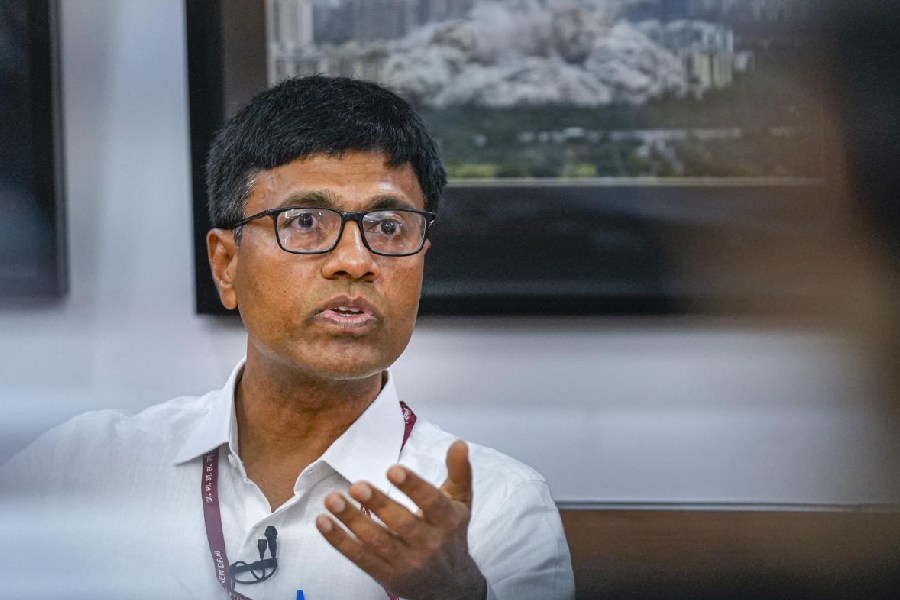Medical students' over-reliance on "google mataji" and the diminishing trend of learning by interacting with patients by their bedside while prioritising getting admission to PG courses are major challenges for the country's medical education system, AIIMS-Delhi Director Dr M Srinivas said.
In an exclusive interview with PTI Editors, Dr Srinivas said that reforms and up-skilling in medical education are a necessity as humans keep evolving.
"That is the job of the National Medical Commission which looks into the medical education of the country. But we have an advantage at AIIMS-Delhi. Since we are not under the purview of NMC, we can do our own little bit of changes and newer experiments in teaching and learning methods," he said.
Dr Srinivas, a paediatric surgeon, highlighted that more and more students are not attending classes and rather consulting the internet thinking "Google mataji will teach them more than the teachers".
He also expressed concern over students' increased focus on securing admission to PG courses.
"That means you give less importance to bedside learning. Because we as students learned more from the patients at the ward, casualty and operation theatres as well as from seniors and teachers.
"Now the focus from the beginning is to get into the PG courses and on how to crack the PG and super-speciality entrance examinations. Then these private courses have come up, these tutorials and the various agencies...that students go through and this has become a big challenge for us," he underlined.
Dr Srinivas said that stress should be on students attending classes as much as possible, visiting hospitals and staying and learning by being at patients' bedside.
Learning from the patients is not just about gaining knowledge, but also about ways of interaction, which involves knowing how to speak to them, being sympathetic and empathetic, and looking at the patient as a family and not just for disease treatment, he said.
On the use of artificial intelligence in the medical field, Dr Srinivas said it is going to be very useful, especially in the Indian context because of its huge population, for early diagnosis and enhancing the quality of treatment.
Srinivas said most departments of AIIMS-Delhi are already incorporating AI in the diagnostic and patient-centric services.
"Today we have AI in X-rays. A resident doctor may be looking at 300 X-rays in a day and the AI will help us to state that this is a normal X-Ray, this is a TB X-ray or the X-ray of a patient with cancer. Triaging is possible.
"Suppose if somebody needs an immediate early intervention, we will get an alert that this patient needs it," he explained.
"The patient goes into the CT scan gantry and then AI is assessing whether there is a bleed in the brain or not and then probably he needs a surgery, if there is a bleed in the brain.
"Normally, it would have taken some time for us to look into a particular report... but today the technology exists," he said.
The AIIMS Director further said that AI will also help us even when someone is remotely connected.
"For example, somebody who has got a diabetic retinopathy in a small village or a town, we may not have a retina specialist in all the places in the country to look into whether diabetes or hypertension have led to the retinopathy. This is a specialised area and very few people are there in the country," he said.
Today the technology exists which allows a doctor sitting in a medical college or an institution in a peripheral centre to look into a condition, he said. "The AI would already filter out the normal retina and the abnormal retina will go to the person who will look into that...AI can give you a diagnosis that this particular case of retinopathy is of this grade and intervention can be done early," he said.
Dr Srinivas further talked about how lifestyle diseases are becoming a major challenge.
It is becoming rare for people to die of appendicitis, cholera and typhoid, he said.
"We have controlled them to a larger extent. But lifestyle diseases are killing us now. We have become number one in most of the diseases. whether it is diabetes, hypertension or obesity, cancer, they are increasing in numbers for various reasons," he said.
First these are lifestyle diseases, second the population is increasing, and third the lifespan is increasing, he explained.
He also highlighted the role media can play in reaching out to the masses and educating them about good diet and the right lifestyle.
On how an integrated approach of using alternative systems of medicines such as Ayurveda and yoga with modern medicine can aid in disease management, Dr Srinivas said the two systems should not be seen as competitors but as complementary to each other.
Citing an example, he said that proven age-old therapies in Ayurveda can be integrated with modern medical treatments for further benefit of patients.
The director said that for treatment of ailments like diabetes, hypertension, migraine and some disease etc, AIIMS-Delhi besides prescribing allopathic drugs also recommends therapies of Ayurveda, yoga and meditation.
Except for the headline, this story has not been edited by The Telegraph Online staff and has been published from a syndicated feed.











